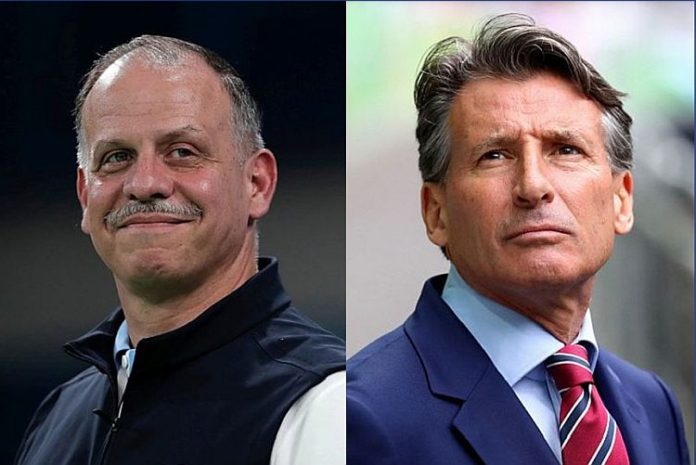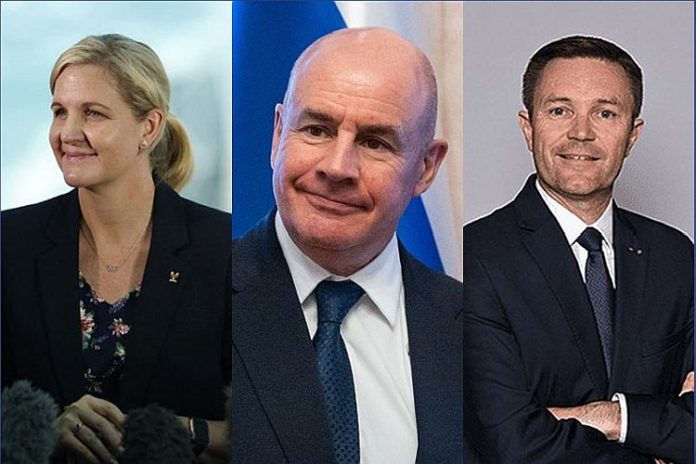★ The Sports Examiner: Chronicling the key competitive, economic and political forces shaping elite sport and the Olympic Movement.★
★ To get the daily Sports Examiner Recap by e-mail: sign up here! ★
≡ IOC PRESIDENTIAL ELECTION ≡
(First of three parts reviewing the Candidate Statements for the IOC Presidency, to be voted on in March 2025 at the 144th IOC Session in Greece.)
The International Olympic Committee published Thursday (19th) the candidate statements of the six men and one woman contending to be the next IOC President, from 2025 to 2033. A look at each and the positions the candidates are taking to appeal to the membership, in alphabetical order.
● Prince Feisal Al Hussein (JOR)
An individual member of the IOC since 2010, Al Hussein is the younger brother of Jordan’s King Abdullah II. At 61, he is eligible to serve a full term to 2033 and his membership could be extended for four years to 2037.
His 20-page manifesto emphasizes sport as a catalyst for a better world, and wants to engage the IOC members in a larger role to make the organization more impactful:
“I firmly believe the IOC’s greatest strength lies in its membership – a diverse and exceptional group of individuals from every corner of the globe. Should I have the honour of leading this Movement, I am committed to harnessing the unique talents and insights of our Members to shape an Olympic future that is innovative, sustainable and inclusive.”
He promotes a vision with three main ideas:
● “Inspire Imagination”
● “Ensure Integrity”
● “Develop Inclusion”
Al Hussein proposes an “Olympic Agenda 2036″ which would see increased revenues, a potential change when Olympic Games are held in view of climate issues, the re-formatting of the Youth Olympic Games as part-festival and part-elite competitions and more engagement with youth, especially through digital means.
His policy priorities are instructive:
● “Reimagine the TOP programme with current and future partners.”
● “Insure our assets and programmes benefit partners between Games.”
● “Establish regional IOC offices co-located with Continental Associations.”
● “Reimagine advertising models to ensure broadcasting rights value.”
● “Optimise our Games revenue distribution model, valuing athletes.”
What does “benefit partners between Games” or “Reimagine advertising models” mean? How will better revenue distribution “valuing athletes” work: is this prize money?
His integrity plank emphasizes athlete safeguarding at all levels, and sustainability. The inclusion section wants more IOC member participation in decision-making and a stronger role for women at all levels of sport, on and off the field.
One clear element in his priority list: “Enable Members to decide the electorate for future host cities” and he also wants to increase the IOC member age limit to 75 from the current 70.
¶
● Sebastian Coe (GBR)
An IOC member since 2020 as President of World Athletics, Coe, 68, would require an extension to serve to 2030 and a change in the age limit to serve a full term to 2033.
Coe’s 22-page statement continues the theme he has carried through more than a dozen interviews he has done with media of all kinds, starting with “I would like to share our Olympic STAGE with all of you, the people with the collective capacity to grasp our opportunities and address our challenges.”
His program uses the acronym STAGE:
● “Sport First”
● “Tomorrow’s Generation”
● “Athletes at the Heart”
● “Growth”
● “Empowerment”
He makes a unique offer on page 5, doubling down on his willingness to be part of a more collaborative IOC team:
“That requires an urgent review of governance structures to deliver a fundamental rebalancing of the roles and responsibilities of the membership and the Executive.
“My focus is on embedding transformative change over the next four years after which I will put myself forward for re-election. You, the members, will be the judges of whether I have delivered.”
The IOC Presidential first term has been eight years for a long time; Coe proposes a unique referendum that would confirm him or reject him within the age-70-plus-four-years-extension, removing (for now) the need to change the Olympic Charter age rules.
Coe promises to extend what he demonstrated at World Athletics: protection of the women’s category, a powerful anti-doping effort, and “maintaining focus on sport and athletes for the full Olympic cycle.”
He wants to appeal to youth more directly, and wants to promote the value of sport more directly to governments:
“The Olympic Movement and Governments share common agendas to build healthy communities. I will tirelessly promote and reinforce the idea that good sports policies are also good education, health, social and nation building policies with measurable returns. Investment in sport is a powerful investment in young people and their futures.”
And Coe is front-and-center about athletes and money:
● “Athletes’ financial well-being will also be prioritised, in consultation with all stakeholders, ensuring their contributions are rewarded fairly.”
● “Athletes drive the value of the Games. I will develop programmes that could allow all athletes to share the commercial rewards they help generate, empowering them as partners, not just participants.”
These are references to the World Athletics’ award of $50,000 to each Paris 2024 gold medalist. Coe has never apologized for making prize money available, but did tell other federations that he was sorry for a lack of communication and consultation about it beforehand.
And as to growth, modernization is his key, especially with new revenue models: “We must start listening to the consumer and deliver what the audience wants, when they want it, where they want it and with a barrier-free physical and digital experience.”
He has called for more IOC member input, crystallizing the issue this:
“Many members have shared concerns that decision-making is overly centralised, leaving them feeling disconnected from the direction of the Movement. They want a more inclusive approach to governance, one that embraces reform and fosters transparency. NOCs and IFs want stronger collaboration and clearer pathways to contribute meaningfully, irrespective of their size.”
He finished by emphasizing his experience, as a two-time Olympic 1,500 m champion, as an athlete advocate, head of a National Olympic Committee, one of the largest International Federations, an Olympic organizing committee and multiple roles in government.
But his offer to serve four years and stand again is an aggressive and insightful play against his age and the Olympic Charter limitations, and makes him a more attractive candidate.
¶
★ Receive our exclusive, weekday TSX Recap by e-mail by clicking here.
★ Sign up a friend to receive the TSX Recap by clicking here.
★ Please consider a donation here to keep this site going.
For our updated, 885-event International Sports Calendar for the rest of 2024, 2025 and beyond, by date and by sport, click here!

























